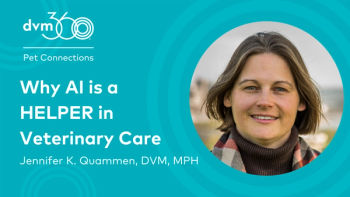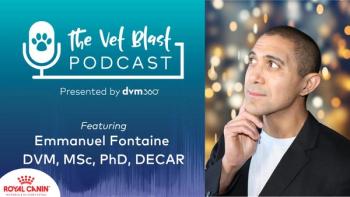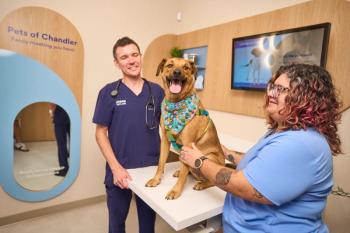
Mind Over Miller: Hypochondria, here we come!
It occurs to me as I lie here suffering an attack of viral gastroenteritis, popularly known as the California crud, that we are becoming a nation of hypochondriacs.
It occurs to me as I lie here suffering an attack of viral gastroenteritis, popularly known as the California crud, that we are becoming a nation of hypochondriacs. As a result of memories associated with childhood ills, I detest being sick. Today, the sick child can look forward to a pleasant interlude away from school, refreshed periodically with delicious pediatric nostrums and entertained constantly by televised Frankenstein films and cartoons of World War II vintage. Not so when I was a child.
This column originally appeared in the September 1972 issue of Veterinary Medicine.
Every illness of my childhood is vividly impressed upon my memory, not so much by the discomfort the illness produced as by the horrors of the specific therapy administered by my mother. I didn't realize it then, and she may still not be aware of it, but my mother was a quack. In fact, all mothers were quacks. In those days, we thought a pediatrician was a foot doctor.
I learned to suppress the cough reflex as a child because, for respiratory disease, my mother applied mustard plasters to the chest. She mixed a poultice of mustard seed and generously buttered a length of flannel with it. This concoction, which could bring tears to the eyes from across the room, was then wrapped around the chest and back and left on until second-degree burns had developed. To this day I survive without the use of underarm antiperspirants due to the charring of my axillary sweat glands by those mustard plasters.
Gastrointestinal disease had its specific therapy, too: the enema. I can still remember the half-gallon enema bag being filled with warm soapy water as Mother soothingly allayed my fears with promises of how "a good cleaning-out will stop that diarrhea." The enema itself was a nightmare with Mother telling me, "Hold it, there's only another half quart," while I screamed, "I can't hold it anymore!" Her enemas effectively removed all of the contents of the intestinal lumen so that afterward, while my lower bowel attempted to prolapse itself, she could point out, "See, it's helped already!"
Incidentally, these therapies of that preantibiotic Great Depression era were strongly endorsed by the family doctor. I remember his $3 house calls, the pulse-taking, the cold stethoscope head, and "Stick out your tongue and say 'aaah'!" After the diagnosis ("He has the grippe.") came the prescription, illegibly scrawled, for the little packets of powder that tasted remarkably like aspirin. "I gave him an enema," my mother would anxiously offer. "Good," the doctor would affirm. "Can you give him a mustard plaster, too?"
My father, too, had his repertoire of cures. If I developed a sore throat, Mother would paint it with Argyrol—a procedure guaranteed to hone one's gag reflex to a keen edge. But when Dad came home, the sore throat was subjected to even more heroic measures. I had to gargle with bourbon whiskey, and the bottle of whiskey Dad kept for this purpose was not of the expensive mellow sort. It was a searing liquid fire against which not even the most virulent streptococcus could prevail. I attribute my present distaste for alcohol to this childhood remedy. If hashish is ever legalized, I may consider forcing my children to eat it in the hope that similar results might be obtained.
When I was a kid, if a day of school were missed because of illness, a note signed by the parent or doctor was demanded, and the excuse had to be valid: "Bobby missed school Monday, Tuesday, and Wednesday because the ambulance bringing him home after his appendectomy stalled on the railroad tracks and was hit by the Super Chief. Bobby's leg had to be amputated just below the knee. P.S. The doctor asked that Bobby be excused from recess until after his prosthesis arrives."
Times have changed. Nowadays, the kids spend a week in bed for such minor ailments as reactions to flu shots, writer's cramp (because two teachers simultaneously gave homework assignments), or overexposure to tear gas at a protest march. And the medications available to us vie with one another for delectability.
I am convinced that the surest preventive for adult hypochondria is the 19th century brand of medicine administered by a determined and doting mother. And now, I must conclude this essay. It's time for another spoonful of my blackberry-flavored Neo-Sul-Dilacto-Gel-O-Kate. Besides, the John Wayne submarine epic is about to begin on Channel 2.
Robert M. Miller, DVM, is an author and a cartoonist, speaker, and Veterinary Medicine Practitioner Advisory Board member from Thousand Oaks, Calif. His thoughts in "Mind Over Miller" are drawn from 32 years as a mixed-animal practitioner. Visit his Web site at
Newsletter
From exam room tips to practice management insights, get trusted veterinary news delivered straight to your inbox—subscribe to dvm360.






